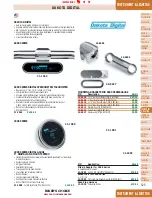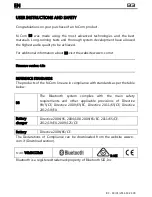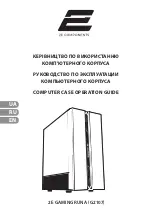
Page 23 of 69
TIRES
Your travel trailer is equipped with wheels and tires selected to match the capacity specifications
of the trailer, as designed by the Manufacturer. Under normal circumstances and with proper tire
maintenance, you should receive many miles of trouble-free service.
Tires on your vehicle must be of the proper size and correctly inflated for the load. All tires
(including the spare tire) on the vehicle should be of the same size, type, and construction. All
tires must be free of punctures, cuts, and excessive wear.
Some travel trailers accumulate relatively few miles and, therefore, the tire age from the date of
manufacture, not mileage, may become the main tire life-determining factor. Bigfoot Industries,
therefore, recommends periodic tire inspection by a reputable tire Dealer.
Inflation
For safety and maximum tire life, vehicle speeds must be proper, correct inflation pressure must
be maintained, and tread depth and wear must be monitored. Properly inflated and maintained
tires also contribute to overall travel trailer stability and safety.
NOTE: Take this seriously!
To
ensure that all tires are properly inflated, tire pressure should be regularly checked when the tires
are cold. The maximum cold inflation pressures are stated on the tire’s sidewall.
CAUTION!
Wheels and tires equipped with your travel trailer are extremely heavy. Do not attempt to
remove the spare tire (if equipped) unless you are capable of handling the weight.
WARNING!
To avoid personal injury and/or property damage if a blow-out or other tire damage occurs,
obtain expert tire service help. Do not attempt to change the tire yourself.
(Amen! Road
service or tire dealer every time)
How Overloading Affects Your RV and Tires
The results of overloading can have serious consequences for passenger safety. Too much weight
on your vehicle’s suspension system can cause spring, shock absorber, or brake failure, handling
or steering problems, irregular tire wear, tire failure or other damage.
An overloaded vehicle is hard to drive and hard to stop. In cases of serious overloading, brakes
can fail completely, particularly on steep hills. The load a tire will carry safely is a combination
of the size of tire, its load range, and corresponding inflation pressure. Excessive loads and/or
under inflation cause tire overloading and, as a result, abnormal tire flexing occurs.
This situation can generate an excessive amount of heat within the tire. Excessive heat may lead
to tire failure. It is the air pressure that enables a tire to support the load, so proper inflation is
critical. Since RVs can be configured and loaded in many ways, air pressures must be
determined from actual loads (determined by weighing) and taken from the load and inflation
tables provided by the tire manufacturer. These air pressures may differ from those found on the
certification label. However, they should never exceed the tire limitation for load or air pressure.
If you discover that your tires cannot support the actual weights, the load will need to be
lightened.
Содержание T2801
Страница 2: ...BIGFOOT TRAILER MANUAL DRAFT 8 APRIL 3 2008 ...
Страница 36: ...Page 34 of 69 ...
















































